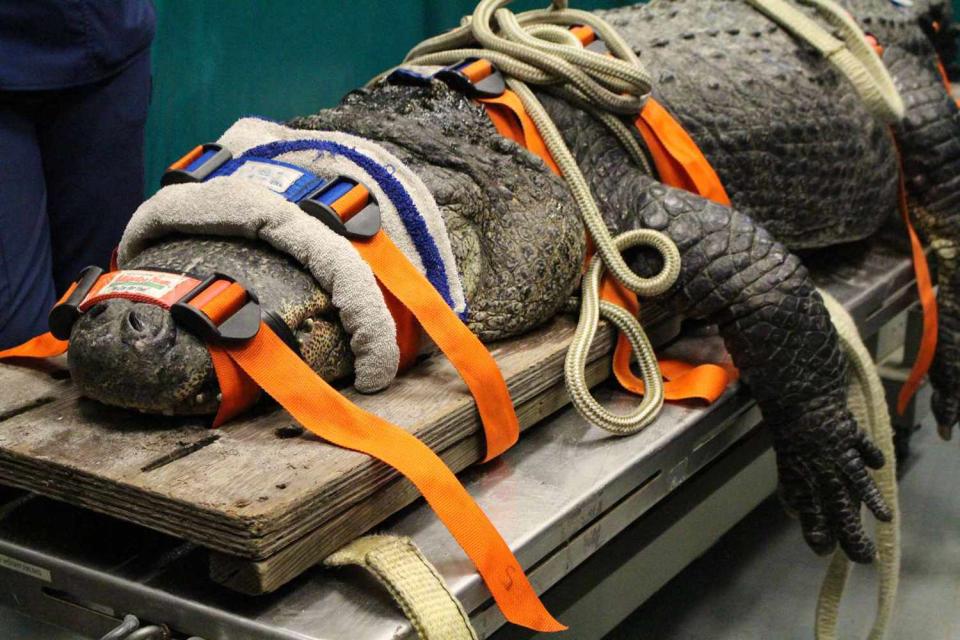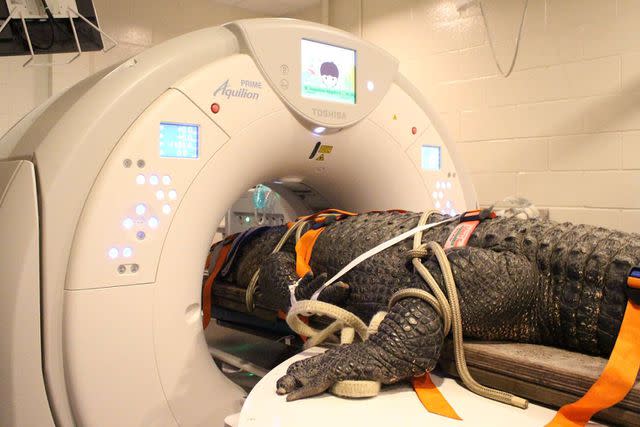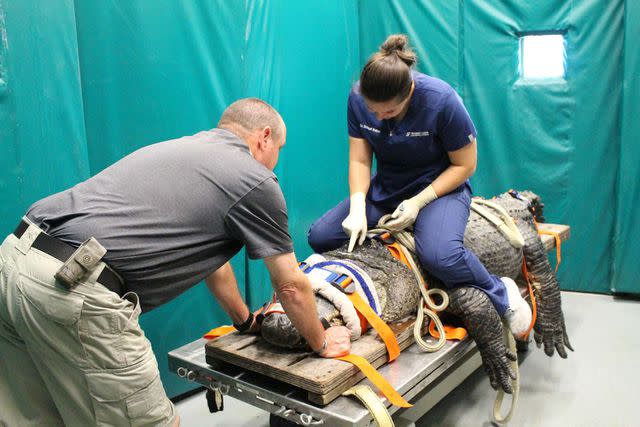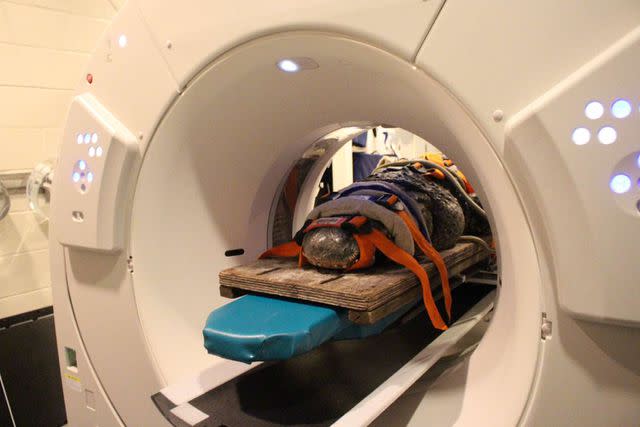Massive Florida Zoo Alligator Gets CT Scan to Identify Strange but Common Problem
A 376-pound reptile named Brooke received treatment for an ear infection after he "displayed intermittent head-rolling in the lagoon"

Sarah Carey
This alligator, named Brooke, is owned by the St. Augustine Alligator Farm Zoological Park and came to the UF Veterinary Hospital for a full diagnostic work-up on July 25A 376-pound alligator named Brooke — who lives at the St. Augustine Alligator Farm Zoological Park in Florida — recently had a visit with the doctor.
The “very popular” nearly 20-year-old reptile was taken in for “a thorough work-up” after exhibiting “unusual behavior,” according to a statement by University of Florida College of Veterinary Medicine.
“According to the park’s reptile curator, Jim Darlington, Brooke — named for the Brookfield Zoo, where he came from originally — has displayed intermittent head-rolling in the lagoon where he lives,” the statement said. “While Brooke was at UF, Dr. Bridget Walker, a UF zoological medicine resident, performed a blood draw to obtain a sample for analysis.”
According to the hospital, Brooke’s head was scanned by a CT machine and his lungs were examined by X-rays. The statement noted that the X-rays were necessary because his body “was too large to perform a complete CT scan of his body.”

Sarah Carey
Brooke is positioned in the CT scanner to obtain a scan of his head“Our zoological medicine service team determined that Brooke had an ear infection and he returned home to the Alligator Farm later that day,” they continued.
“Gators taking care of Gators! ,” the St. Augustine Alligator Farm Zoological Park wrote in a Facebook post, referencing the University of Florida’s mascot — a gator. According to the park, questions surfaced in light of the event, such as: Where are the ears on an alligator?
“A crocodilian’s ear is directly behind their eyes and can close tightly to prevent water from getting in,” the park wrote.

Sarah Carey
Dr. Bridget Walker, a zoological medicine resident at UF, obtains a blood sample using the venous spinal sinus, located on the top of Brooke's head. Jim Darlington, reptile curator at the St. Augustine Alligator Farm, assists.The park said “in order to draw the amount of blood we needed for all of his tests in the most efficient fashion, we needed to utilize the sinus located on the top of his head,” in response to an inquiry about the person on the reptile’s back.
“This is common practice in crocodilian medicine, and only done when deemed necessary for sample collection,” they continued. As far as receiving medicine for the future, the park said that “Brooke has years of experience” eating food — at times with medicine — and “holding still.”
“Some of our crocodilians are trained to remain still for blood draws without restraining them,” they continued. “So, however Brooke needs medical treatment, he will be able to receive it without any stress or worry.”

Sarah Carey
Brooke positioned in the CT scanner for imaging of his head.Related: Large Alligator Swims Out of Ocean and onto Alabama Beach Surprising Visitors — Watch!
Brooke isn't the only US zoo resident to have needed some medical attention recently. As PEOPLE reported last week, a pregnant orangutan named Eirina from the Denver Zoo orangutan was recently experiencing morning sickness and discomfort.
Eirina’s animal care specialists observed that she had a reduced appetite, a sluggish demeanor, and lacked her normal personality.
"She has never been pregnant before. This whole experience is new for her," Cindy Cossaboon, an animal care specialist with the Denver Zoo, told PEOPLE.
Related: Three Whales Breach in Unison in 'Epic Whale Ballet' Off Cape Cod — Watch!
"When I was pregnant, I was a high-risk pregnancy, so I started taking this tea hoping it might help,” Cossaboon recalled. “The benefit I found was that it really helped my morning sickness.”
Cossaboon was talking about a "traditional medicinal pregnancy tea" with ingredients like raspberry leaf, spearmint, stinging nettle, and fennel fruit.
Never miss a story — sign up for PEOPLE's free daily newsletter to stay up-to-date on the best of what PEOPLE has to offer, from celebrity news to compelling human interest stories
"It was one of the few things that made me feel better. I talked with my managers, veterinarian team, and nutrition team to see if this was something we could try with Eirina," Cossanoon said of her next steps.
After Eirina drank the tea, Cossaboon and the other caretakers noticed a positive change in her health and mood.
"When I arrive in the morning, I get her tea ready,” Cossaboon said. “While it is seeping, I go check on her. She is always still in her nest under her blankets. I then go get her tea, and when she sees me coming, she sits up and is ready to drink her tea.”
For more People news, make sure to sign up for our newsletter!
Read the original article on People.

